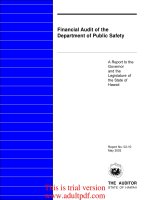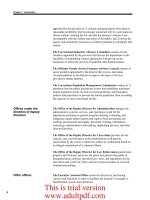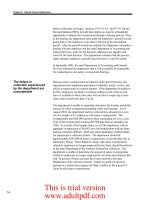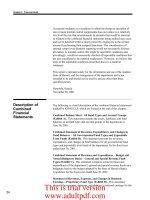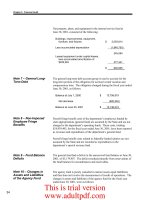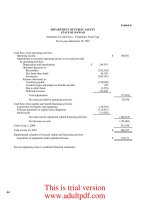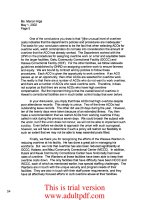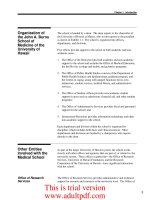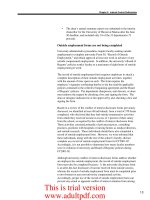FINANCIAL AUDIT First Audit of the Library of Congress Discloses Significant Problems _part4 doc
Bạn đang xem bản rút gọn của tài liệu. Xem và tải ngay bản đầy đủ của tài liệu tại đây (1.02 MB, 10 trang )
Appendix II
Report on Compliance With Laws
and Regulations
As part of our attempt to audit the financial statements of the Library
of Congress as of September 30, 1988, we made such tests of compliance
with laws and regulations as we considered necessary in the circum-
stances. Because of issues raised during our review concerning the
FED-
LINK
program, we expanded our work to include extensive testing of
compliance with laws and regulations applicable to that program.
The management of the Library of Congress is responsible for compli-
ance with laws and regulations applicable to the Library. Our review of
compliance with laws and regulations, made for the purpose described
in the preceding paragraph, does not necessarily cover all laws and reg-
ulations with which the Library is required to comply. As part of our
work, we reviewed and tested compliance with provisions of:
the Library’s basic governing legislation (2 USC. 131-175),
the Copyright Law (17 U.S.C. 101 et seq.),
the Economy Act (31 U.S.C. 1535-1536),
the Anti-Deficiency Act (31 U.S.C. 1341, 1342, and 1511-1519),
legislation concerning recording obligations and balances available for
obligation (31 U.S.C. 1501 and 1502),
the Advertising Act (41 U.S.C. 5),
the Federal Property and Administrative Services Act (40 USC. 759)
and
the 1988 Legislative Branch Appropriations Act (Public Law 100-202).
As a result of our review, we found a number of instances in which the
Library did not comply with applicable laws. We also found instances in
which the Library’s weak internal controls and poor records prevented
us from obtaining the information needed to assess compliance. These
instances, and Library action since 1988 which correct or reduce the
noncompliances, are summarized in the following discussion.
Funds Transferred to
We found that the Library violated 31 U.S.C. 1502(a) by using annual
FEDLINK Program
appropriations other agencies transferred to it under the Economy Act
before fiscal year 1988 to pay for fiscal year 1988
FEDLINK
services. The
Improperly Used in
Library had not established internal control policies and procedures to
Subsequent Fiscal
ensure that
FEDLINK
fund expenditures were made only from properly
Years ”
available appropriations.
Under 31 U.S.C. 1502(a), a fiscal year appropriation may be used only
for contracts which are obligated within, and meet the needs of, that
Page 29
GAO/AFMD-91-13 First Audit of the Library of Congress
This is trial version
www.adultpdf.com
Appendix IS
Report on Compliance With Laws
and Regulations
fiscal year. In addition, Title 7 requires that when advances from agen-
cies for reimbursable services exceed the actual costs of performance
for a fiscal year, the excess should be refunded promptly upon comple-
tion of performance. These rules applied to appropriations transferred
to the Library under the Economy Act. Therefore, the Library could not
properly use residual prior fiscal year annual appropriations received
from ordering agencies to pay for
FEDLINK
data base and
ADP
services
actually provided during subsequent years.
Rather than deobligating amounts transferred from other agencies when
the appropriations expired, the Library used remaining balances to pay
for contract services for subsequent years even though these funds were
no longer legally available for expenditure. The Library instructed
FED-
LINK
customers, in signing up for each year’s services, to deduct prior
year carryover amounts in determining how much funding to transfer to
the Library for the new year’s services. We found over 300 cases where
FEDLINK
customer agencies carried over prior year funds to acquire fiscal
year 1988 services totaling almost $1.4 million,
One agency used about $1,547,000 of services from
FEDLINK
vendors in
fiscal year 1988 and part of fiscal year 1989, but had transferred only
about $1,333,000 in appropriations to
FEDLINK
during that period. The
Library paid the shortfall, about $214,000, using expired appropriated
funds previously transferred from that agency.
Since 1988, the Library has notified agencies of its policy limiting the
use of prior year appropriations to (1) only pay for prepayments for
services rendered during the first quarter of the subsequent fiscal year
and (2) only when the agency states before the end of the fiscal year to
be charged that it intends to use the vendor’s services in the following
fiscal year. Under these limitations, the Library reports that carryovers
have fallen from $41.3 million carried over from 1988 to 1989 to $2.1
million carried over from 1990 to 1991.
Although this policy has limited the amount of funds which are improp-
erly used, in our view, the Library lacks authority to carry over expired
fiscal year appropriations to pay for data base and
ADP
services in the
following fiscal year. In its comments on a draft of this report, the
Library stated that it will no longer permit carryover of funds.
Page 30 GAO/APMD-91-13 First Audit of the Library of Congress
This is trial version
www.adultpdf.com
Appendix II
Report on C-ompliauce With Laws
and hgulatious
The Library’s
We found that the Library continued to use certain revolving gift funds
Revolving Fund
in a manner which exceeded its authority. In fiscal year 1988, the
Library operated 12 revolving funds to finance a number of activities
Operations Exceeded
(for example, the sale of photo duplication, recordings, and publications)
Its Statutory
with revenue ranging from $940 to almost $3.7 million per fund. The
Authority
funds were created by gifts which donors designated to be used as self-
sustaining activities. The gifts were then operated as revolving funds
and are now many times larger than their original size.
The Library is authorized by 2 U.S.C. 160 to accept “gifts or bequests of
money for immediate disbursement in the interest of the Library, its col-
lections, or its services.“2 In our report, Library of Congress’ Revolving
Trust Funds, FGMS-80-76. Sentember 24. 1980. we concluded that sec-
tion 160 does not authorize the Library to set charges for goods and
services provided through self-sustaining (revolving) gift funds which
(1) enlarge the funds beyond the original amounts donated, (2) produce
revenues for other activities, or (3) create a substantial surplus. We also
noted that the operation of the Library revolving gift funds consider-
ably diminished the Congress’ ability to oversee and control the size and
use of these funds. Therefore, we recommended that the Library seek
statutory authority to finance those activities, for which the gifts were
originally donated to the Library, through revolving funds.
In response to our 1980 report, the Library now provides the Congress
with additional information in its annual budget submission and notifies
its oversight committees when it proposes to accept new gifts designated
for self-sustaining activities. However, in a letter to the Library’s Gen-
eral Counsel, B-198730, December 10,1986, we continued to express
concern about the Library’s reliance on its general gift authority to
maintain revolving funds. We have not identified any additional actions
taken since 1986 to give the Library a specific statutory basis for the
use of such gifts as revolving funds or to bring such funds under effec-
tive congressional oversight.
Subsequent to our review, the Library prepared draft legislation which
would authorize it to transfer the gift funds which are being used as
revolving funds into a new Library of Congress revolving fund. On
June 27, 1991, S. 1416, a similar bill, was introduced in the Senate.
?Jnder 2 U.S.C. 164-162 and 163, the Library of Congress Trust Fund Board is authorized to accept
gifts “for the benefit of, or in connection with, the Library, its collections, or its service, as may be
approved by the Board and the Joint Committee
on
the Library.” This authority has not been used to
accept the gifts designated to be used as self-sustaining activities.
Page 31 GAO/AFMD-91-13 Pirst Audit of the Library of Congress
This is trial version
www.adultpdf.com
Appendix II
Report on CampUance With Laws
and Regulations
The Library
Improperly Accepted
Nonappropriated
Fund Reimbursements
as Gifts
Some FEDLINK
Contract Awards
Violated the
Advertising Act
The Library improperly used gift fund accounts to accept nonap-
propriated funds to pay for
FEDLINK
services. Library officials who are
responsible for the gift funds have stated that these accounts were
established to accept and retain nonappropriated fund reimbursements
for providing
FEDLINK
services to “quasi and nongovernmental organiza-
tions.” However, the Library’s authority to accept gifts under 2 USC.
160 does not authorize the Library to accept these nonappropriated
reimbursements. Gifts are defined as gratuitous conveyances or trans-
fers of ownership in property without consideration. Reimbursements
for
FEDLINK
services are not gratuitous conveyances without considera-
tion and therefore, are not gifts encompassed within section 160. In
addition, the Library does not have authority under any other law to
receive nonappropriated fund reimbursements and treat them as gifts.
Thus, the Library acted improperly in receiving nonappropriated funds
as reimbursements for
FEDLINK
services provided and treating them as
gifts. In fiscal year 1988, the Library received about $800,000 in rev-
enue for
FEDLINK
services and recorded it in the gift fund accounts.
Because the Library records did not specifically identify the customers
who paid for their services through the gift funds, we could not deter-
mine how many
FEDLINK
customer accounts were treated in this manner.
The Library informed us that, since 1988, it has changed its policy and
has closed the
FEDLINK
gift funds. It now offers
FXDLINK
services only to
federal agencies paying with appropriated funds, or to authorized gov-
ernment contractors with cost reimbursement contracts. The Library’s
policy, if properly implemented, would ensure that all
FEDLINK
costs are
ultimately paid by appropriated funds.
In fiscal year 1988, the Library, under its
FEDLINK
program, awarded 242
contracts (worth about $50.6 million) in violation of the Advertising
Act. The act generally requires federal agencies to advertise for pro-
posals before awarding goods or services contracts over $26,000. The
act exempts any contract for which the contracting officer involved cer-
tifies that there is only one responsible source. During fiscal year 1988,
we found that the Library awarded 586
FEDLINK
contracts, each of which
exceeded $25,000 and thus was subject to the Advertising Act. We
examined a sample of 242 contract files amounting to $50.6 million and
found no evidence that the Library sought competition among vendors
before awarding these contracts. Instead, the Library simply sent orders
to the vendors requested by the ordering agencies. Further, we found no
Page 32
GAO/AFMD-91-13 First Audit of the Library of Congress
This is trial version
www.adultpdf.com
Appendix II
Report on Compliance With Laws
and Regulations
evidence that the Library’s contracting officers certified that the ven-
dors selected were the sole responsible sources of the goods and services
involved.
Starting with fiscal year 199 1, the Library established a policy requiring
orders for
FEDLINK
services valued at over $25,000 from a particular
vendor to be publicized in Commerce Business Daily. If no other vendors
notify the Library that they can offer the required services, Library con-
tracting officers certify that there is only one responsible source and
award the order. This policy, if properly implemented by the Library,
will correct the noncompliance found in our review.
The Library’s Records
The Library’s accounting system did not provide the information neces-
Cannot Be Used to
sary to determine whether the
FEDLINK
reimbursements it received and
retained were limited to the amounts allowed under the Economy Act. A
Assess Compliance
federal agency which provides goods or services to another agency
With Cost Controls in
under the Economy Act may be reimbursed for (1) its costs to either
the Economy Act
directly provide or pay a vendor for the service and (2) other costs
which it incurs incident to providing or purchasing the service. Any
amount which an agency receives and retains as a reimbursement must,
at a minimum, bear a significant relationship to the services provided or
work performed by the agency.
In fiscal year 1988, the Library entered into Economy Act agreements to
provide $117 million in
FEDLINK
services to various federal agencies. The
agencies receiving the Library’s
FEDLINK
services transferred about $5.6
million to the Library to reimburse it for its costs in excess of payments
to
FEDLINK
vendors. However, because of the Library’s poor accounting
systems, the Library could not demonstrate any significant relationship
between its costs of providing
FEDLINK
services and most of the fees it
charged. The Library could only demonstrate that about $930,000 in
costs had a significant relationship to the
FEDLINK
services it provided.
Although we are aware that total costs recoverable would have
exceeded $930,000, the Library’s accounting records did not provide
sufficiently detailed information to determine how much of the addi-
tional $4.6 million the Library received in reimbursements represented
allowable costs under the Economy Act. Therefore, we are unable to
resolve whether the Library complied with the Economy Act’s require-
ment to limit reimbursements to actual costs.
Page 33 GAO/AFMD-91-13 Nrst Audit of the Library of Cougress
This is trial version
www.adultpdf.com
Appendix II
lbdo~;~;nliance With Laws
In 1990, the Library had a consultant study the appropriate costs to
charge agencies which participate in the Library’s reimbursable pro-
grams. The consultant’s report, using fiscal year 1990 budget informa-
tion, estimated the Library’s cost of providing
FEDLINK
services at $3.4
million in 1990 and $3.3 million in 1991. The Library has used these
estimates to revise the fees it charges its
FEDLINK
customers to recover
Library costs. Until the Library establishes an accounting system which
provides the information necessary to determine the actual costs of
FED-
LINK
and other Library operations, the study results will provide a more
reasonable basis than in the past for what costs may be properly
charged to
FEDLINK
users.
The Library’s Records
The Library’s accounting system did not provide the information needed
Cannot Be Used to
to determine whether the Library used its Economy Act reimbursements
in accordance with the Legislative Branch Appropriations Act for 1988.
Assess Compliance
The act restricted the Library from using Economy Act reimbursements,
With the 1988
which were for its general and administrative overhead costs, to employ
Legislative Branch
Appropriations Act
more than 66 employees. The Library’s Administrative Working Fund,
which was intended to finance the indirect, administrative overhead
positions attributable to reimbursable programs, was used to pay about
60 employees during 1988. However, as discussed previously in this
report, the Library’s accounting system did not provide the cost
accounting information necessary to determine the costs it incurred in
operating its reimbursable programs. Therefore, the Library had very
little assurance that reimbursements it received were properly catego-
rized as either administrative overhead costs or direct costs. Funds iden-
tified as direct cost reimbursements by the Library may in fact be
administrative overhead cost reimbursements. Those funds may have
been used to pay employees beyond the 60 paid from the Administrative
Working Fund. Accordingly, because the Library’s records did not pro-
vide the cost information necessary to determine where its reimbursable
costs were being incurred and for what purposes, we are unable to
ascertain whether the Library complied with the appropriations act
restriction.
The consultant study which estimated the Library’s 1990 and 1991 costs
for operating
FEDLINK
also estimated the proper allocations of those costs
between direct costs and indirect costs. Without an effective accounting
system to provide actual cost information, the Library still lacks assur-
ance that it is complying with the limits of its annual appropriations act.
Page 34
GAO/AFMD-91-13 First Audit of the Library of Congress
This is trial version
www.adultpdf.com
Appendix II
Report on Compliance With Laws
and Regulations
The Library’s
The Library did not employ the necessary controls and procedures to
Procedures Could Not
determine whether
ADP
contracts awarded under the
FEDLINK
program in
fiscal year 1988 complied with dollar ceilings established by the Federal
Be Relied Upon to
Property and Administrative Services Act. These dollar ceilings vary by
Ensure Compliance
type of
ADP
service and number of responsible sources. The act provides
With Limitations on
ADP Service
Procurements
the General Services Administration
(GSA)
with the sole authority to pro-
cure
ADP
services for federal agencies, but authorizes
GSA
to delegate its
authority to award
ADP
contracts to other agencies.
GSA
delegated
authority to the Library to award
FEDLINK
contracts for bibliographic
and data base retrieval services. Blanket delegations in the Code of Fed-
eral Regulations authorize all agencies to award
ADP
contracts meeting
various specified criteria.
We judgmentally selected a sample of 242 contracts with vendors that
received more than
$100,000
in
FEDLINK
contracts during fiscal year
1988. We examined the Library’s contract records to determine if the
Library had authority to award the contracts and found that 62 percent
of the contracts in our sample complied with the terms of either the spe-
cific delegation from
GSA
or the blanket delegations. One contract did not
comply with either of the delegations and was, thus, an unauthorized
ADP
procurement. However, for the remaining 38 percent of our sample,
the available information was not sufficient to determine whether the
Library had authority for the purchases. The information in the
Library’s records did not sufficiently describe what was being pur-
chased and the related costs.
Since 1988, the Library has adopted a policy of limiting all orders placed
through
FEDLINK
to the specific services covered by the delegation of
procurement authority which
GSA
issued to the Library. The basic
ordering agreements which the Library now negotiates with
FEDLINK
vendors exclude data base development, equipment, personnel services
and other types of services not included in the delegation from
GSA.
The
Library has ensured that this policy is complied with by not accepting
specific agency orders and vendor basic ordering agreements. Continua-
tion of these steps should resolve the problem raised in our review.
Conclusions
The Library did not comply with applicable laws and regulations in
maintaining revolving funds under its gift fund authority, accepting and
retaining nonappropriated funds as reimbursements for
FEDLINK
ser-
vices, and seeking competition prior to awarding contracts. In addition,
because of the Library’s inability to determine the costs of its reimburs-
able programs, we are unable to resolve whether the Library complied
Page 35
GAO/APMD-91-13 First Audit of the Library of Congress
This is trial version
www.adultpdf.com
Appendix II
Report on Compliance With Laws
and Re@datSons
either with the Economy Act requirement for charging agencies for the
actual cost of providing services under reimbursable programs or with
the appropriations act limit on funding employee positions from
Economy Act reimbursements for general and administrative overhead
costs. Finally, because of the lack of essential information about the
Library’s purchase of
ADP
services for
FEDLINK,
we are unable to resolve
whether delegated authority existed for 38 percent of the
FEDLINK ADP
contracts we examined.
Because of the material instances of noncompliance noted in the pre-
ceding paragraphs, we cannot state that the Library was in compliance
with the terms and provisions of laws and regulations for those transac-
tions not tested.
Recommendations
.
To address the compliance issues discussed, we recommend that the
Librarian of Congress:
Ensure that appropriations transferred to the Library from other fed-
eral agencies are expended only for services provided during the fiscal
year for which the appropriations are available.
Seek statutory authority to use gifts for self-sustaining activities as
revolving funds.
Stop accepting nonappropriated funds as reimbursements for
FEDLINK
services.
Ensure that prices charged customers under the
FEDLINK
program reflect
the Library’s actual costs.
Ensure that the number of staff positions financed from Economy Act
reimbursements complies with the limitation imposed by law.
Agency Comments and
With the exception of our finding concerning the 65 employee limit, the
Our Evaluation
Library agreed with our findings and recommendations and pointed out
steps it is taking to ensure that it is in compliance with applicable laws
and regulations. With respect to the 65 employee limit, the Library dis-
agreed that its records cannot be used to assess compliance with the
requirement to limit to 65 the number of employees who can be paid
with Economy Act reimbursements for indirect costs. It stated that the
staff positions paid as direct costs are in direct support of the programs
and thus are direct costs; only the approximately 60 positions paid from
the Administrative Working Fund are indirect cost employees.
Page 36 GAO/AFMD-91-13 First Audit of the Library of Congress
This is trial version
www.adultpdf.com
Appendix II
Report on Compliance With Laws
and Regulatione
However, our audit disclosed that without a reliable system or method
to accumulate costs, the Library is unable to ensure that all the indirect
costs for employees providing administrative services to its reimburs-
able programs have been recorded in the Library’s records. Additional
personnel could also have provided indirect support to the Library’s
reimbursable programs, but these costs would not have been recognized
under the Library’s current indirect cost accumulation method. If more
than five additional employees provided such indirect support services,
the Library would have violated its annual appropriations act limit of
65 employees paid for by indirect cost reimbursements.
Page 37
GAO/AFMD-91-13 First Audit of the Library of Congress
This is trial version
www.adultpdf.com
Appendix III
Consolidated Statement of ITinmciaJ. Position of
the Library of angress for the Fix&l Year
Ending September 30,1988
We attempted to audit the following consolidated statement of financial
position of the Library of Congress as of September 30, 1988. This state-
ment is the responsibility of the Library of Congress management.
We are not expressing an opinion on this financial statement because it
was not practical for us to perform the necessary auditing procedures
required to satisfy ourselves as to
l
the quantity and value of the Library’s collection, disclosed in note 9;
l
the quantity and cost of the Library’s furniture and furnishings;
l
the amounts of the Library’s accounts receivable and advances from
others; and
l
the amounts of the Library’s reimbursable costs and related
reimbursements.
Because of the materiality of the weaknesses discussed in detail in appen-
dixes I and II, we caution users that the Library’s September 30, 1988,
consolidated statement of financial position has limited reliability.
Page 38 GAO/AFMD-91-13 First Audit of the Library of Congress
This is trial version
www.adultpdf.com
